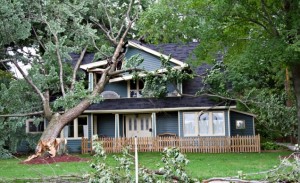Is it Possible to Insure Your Home Against Hurricane Damage?

Preparing for a hurricane at home.
It can be one of the costliest mistakes to underestimate the power and deadliness of a hurricane. It may be a wise move to buy adequate insurance coverage to protect your home against potential damage caused by a hurricane. More importantly, effective preparedness for such an emergency can minimize the chances of damage and may even lead to a reduction in your home insurance costs.
Insurance Against Hurricane Damage
One of the most common fallouts of a hurricane is the damage caused to your home due to flooding. However, flood damage is not covered under your regular home insurance unless you buy additional flood insurance offered under the National Flood Insurance program. The costs of this insurance can be much higher for people residing on high-risk coastlines or flood plain areas.
In any case, a typical homeowner policy will offer coverage for wind damage. Check the amount of coverage in your policy for wind damage to your home, which can include a torn roof, shattered windows, and damage to the interiors caused by water falling into the home. Damage caused by fallen trees or tree limbs on your home, shed or garage may also be covered in your homeowners policy.
Since the traditional homeowner policy usually does not provide coverage for hurricane damage, hurricane deductibles have been permitted in the homeowner policies in the 18 coastal states. The cost of such deductibles can be fairly high, depending on the amount of anticipated risk in a particular location. On average the deducible in such areas may cost anywhere between one and five percent of the total value of the home insurance. Traditional homeowner policies, however, usually include coverage for the cost of a family’s everyday living such as food and housing, while the home is under restoration.
How to Prepare for a Hurricane?
A home that is in a solid state of preparedness against a possible hurricane will face a reduced risk of damage. Some key measures may even lead to a reduction in insurance costs upon negotiation with the insurance company.
Emergency Kit Readiness
If you reside in a hurricane prone area, it is advisable to have an emergency kit ready when there is an anticipation of a hurricane. The kit should include food and water supply for at least three days, apart from basic first aid items and a flashlight with extra batteries. Special supplies and medications should also be kept ready for infants, elderly, and the sick.
Securing the Home before Evacuation
Damage to your home can be minimized if you have made appropriate preparations in advance to secure your home prior to evacuation. All the windows in the home must be covered with permanent storm shutters. Alternatively, you can board the windows with 8-inch marine plywood. To minimize roof damage, you can install clips or straps to securely fasten the roof to the frame structure.
Shrubs and trees around the house should be trimmed to improve their wind resistance. Congested or loose rain gutters should be cleared. Garage doors should be reinforced to minimize the chances of structural damage. All the outdoor furniture, exterior décor, trash bins, and any other loose items in the garden should be brought in. Electrical appliances and equipment should be unplugged.
